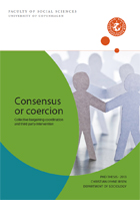Consensus or coercion - Collective bargaining coordination and third party intervention
PhD dissertation by Christian Lyhne Ibsen
While under severe pressure during the recent four decades, collective bargaining still constitutes the main regulatory process by which labour markets are governed in Europe. Approximately 60 percent of the employees in Europe still have their wages, working time, holidays etc. determined by collective agreements between trade unions and employer associations.
On one hand, collective bargaining puts a floor under terms and conditions of employment and collective bargaining is therefore rightly regarded as a centrepiece of the European Social Model. Through collective representation and bargaining, workers are arguably better protected from some of the social risks that labour markets entail. On the other hand, collective bargaining can be beneficial for employers. Internationalisation of economies has increased the need for coordination across industries due to macro-economic concerns for price stability and employment. Integration of product markets means that costlevels within a country must not exceed the competitors in other countries. This gives impetus for actors to moderate wages across industries using collective agreement as a ceiling for labour costs. As such, coordinated collective bargaining holds the dual-promise of reducing social risks for workers and containing costs for employers.
 If collective bargaining as a regulatory process hinges upon the ability of parties to reach agreements, institutions that facilitate this should be pivotal. All over the Western world, institutions for conciliation, mediation or arbitration by third parties exist to help unions and employers settle in bargaining. These institutions have, however, often been neglected in studies of how collective bargaining is evolving and sustained. To remedy this omission, this dissertation explores the conditions for and the role of third party intervention into collective bargaining.
If collective bargaining as a regulatory process hinges upon the ability of parties to reach agreements, institutions that facilitate this should be pivotal. All over the Western world, institutions for conciliation, mediation or arbitration by third parties exist to help unions and employers settle in bargaining. These institutions have, however, often been neglected in studies of how collective bargaining is evolving and sustained. To remedy this omission, this dissertation explores the conditions for and the role of third party intervention into collective bargaining.
The dissertation consists of five papers which aim to understand the relationships between institutions, processes and outcomes of coordinated collective bargaining between organisations for workers and employers. The papers have partly overlapping hypotheses, levels of analysis, data and research designs. Together they explore and explain how configurations of institutions are created and sustained over time and how they influence bargaining processes and outcomes.
- The first paper compares coordinated collective bargaining in Sweden and Denmark since the decentralisation of bargaining from peak-level confederations to primarily industry-level bargaining.
- The second paper tries to explain why some countries have strong institutions of mediation.
- The third paper investigates how the economic crisis was handled in the 2010 collective bargaining rounds in the pattern-setting manufacturing sectors of Sweden and Denmark.
- The fourth paper shows how collective bargaining contributes to the development of so called flexicurity – combinations of labour market flexibility with social security.
- The fifth and final paper takes a step back and reviews the concept of bargaining coordination from three different theoretical approaches.
The dissertation generally supports the view that collective bargaining as a regulatory process can achieve positive results for both employers and employees. However, it also identifies the demanding institutional preconditions needed to sustain collective bargaining under volatile markets and technological change. Furthermore, the dissertation stresses that collective bargaining institutionalises power-relations among actors and that the specific details of institutions will have distributive consequences. Ultimately, the continued support for bargaining by strategic actors resides in how well conflicts between these actors are resolved. This dissertation shows that mediation institutions can play an important role herein – and that they certainly have done so in Sweden and Denmark.
Christian Lyhne Ibsen's PhD dissertation can be bought at Academic Books, Øster Farimagsgade 5, 1014 Copenhagen K or you can download it as a pdf here.
